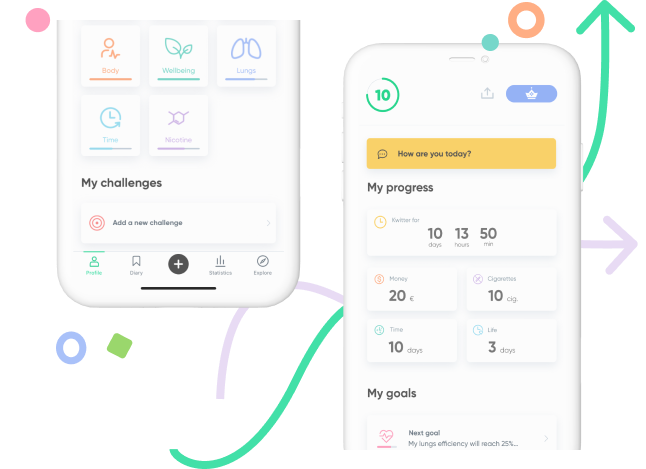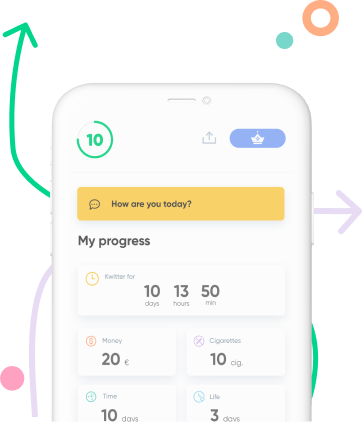August 26, 2020
Personal Development
How to set goals and achieve them successfully?
Goals are an integral part of our lives, whether they are professional or personal. In each area, it’s important to have specific goals and to know when we will achieve them. In this article, Kwit gives you all the tools you need to set goals and succeed in reaching them.
Before setting goals, it’s important to check that they are in line with your values. Ask yourself what you would like to accomplish in X weeks/months/years and what you would like to change. Think about who you want to be and how you would like to be perceived. For example, as a determined person, a calm person, a person who knows how to listen to others...
Step 1: Set your goals
Once you have asked yourself who you want to be, try to become that person by setting goals.
For example, you want to become a stronger person and regain your self-confidence. Being a strong person can mean having strength, having more muscles, being able to push yourself beyond your limits, etc. The solution may be to start exercising, find out what activities are available near your home (sports clubs, gyms), you can suggest to friends to go for a walk once a week, and finally you can also do sports sessions at home (many options are possible even without any equipment).
Here is another example: you want to adopt a more ecological lifestyle. You can choose to change the way you consume, whether it be in terms of food, clothing, waste reduction or the way you travel. For example, you can choose to buy your fruits and vegetables at markets or from local producers. You can also choose to buy in bulk to reduce your waste.
Step 2: Break down your objectives into sub-objectives or tasks
Above all, it’s important to understand the term "breaking down a goal". Breaking down an objective is making a list of tasks to be accomplished in order to reach the final objective.
If you want to quit smoking, your tasks or sub-tasks will be to set your quit date, list your motivations, reduce your cigarette consumption, get rid of your lighters and ashtrays...
But why is it important to break down a goal? Simply to make it easier to reach.
How to do it? To break down your goals, it's important to know what you'd like to accomplish in each area, especially if you project yourself over several years.
To do this, ask yourself several questions:
What is my ultimate goal?
When do I want to reach it?
How can I reach it more easily / how can I make it more accessible?
For example, if you want to become vegan within a year, start by stopping the eggs, then remove milk from your diet, then stop cheese, etc. During this stopping process you can reward yourself.
Here is another example, if your goal is to be in better shape within a year, start by cutting your sugar intake in half, do at least 20 minutes of sport a day for two weeks and then increase to 40 minutes .
If you want to quit smoking in two months, cut down your cigarette consumption every day or every week, start changing your habits, prepare yourself by implementing strategies to compensate for possible cravings.
Beware! Don't set yourself more than three sub-tasks a day. The more sub-tasks you have to reach each day, the harder it will be for you to reach them. You will then feel a drop in productivity, which will reduce your motivation and your regularity...
In order to keep your motivation to the maximum, write down each objective accomplished during the day:
Today I reduced my cigarette consumption by X.
Today I got rid of all my lighters.
Today I preferred the stairs to the elevator.
Today I walked or biked to work instead of using the car or public transport.
Thanks to this exercise, you will be able to see how much progress you have made. If your sub-objectives still seem too complicated to achieve, don't hesitate to break them down again, and so on until you come across objectives that can be achieved in a few days.
Step 3: Adapt your goals according to your energy and desires
Note that it’s important to adapt your activities according to your energy and to listen to the signs your body sends you.
The goal is not to exhaust yourself. Bad days happen to everyone! You'll be fitter tomorrow.
For example, if you are tired, prefer a softer physical activity, walk instead of taking public transport, or go for a walk in the forest instead of hiking in the mountains.
Conversely, if you are in great shape, you will probably be motivated, so take advantage of this opportunity to work out and surpass your best performance!
Listening to you remains the most important thing. You must accept unproductive moments and take them as moments to recharge your batteries.
Our body and mind are closely linked. If you are emotionally tired, your body will be too. This is why, to recharge your batteries will necessarily be beneficial for your peace of mind as well as for your morale.
Take the time to go for a walk, take a bath, meditate, remember good times...
The idea is to know how to say stop and to remember that break timesnare essential to encourage creativity and productivity.

Step 4: Adjust your goals over time when necessary
It’s also important to adjust your goals regularly. Are you sticking to the time limit? Do you need more or less time? Do your sub-objectives help you reach your final goals?
For example: you smoked 15 cigarettes a day. After two months you are smoking only 5, but it’s still difficult for you to limit yourself to 5 cigarettes a day because you feel strong cravings. Perhaps delay your final goal of quitting smoking for next month, and readjust your goal by reducing your consumption from two to one cigarette a week.
Step 5: Anticipate obstacles that may arise
The road to the most difficult goals is strewn with obstacles that will challenge you. So analyze the different obstacles you might encounter on this road.
First, having an idea of the obstacles you might encounter will help you create a plan to control or avoid them.
For example, your ultimate goal is to quit smoking. Obstacles you may encounter are gaps, skids. But how can you avoid them?. You can analyze the places or emotions that may cause you to fall and try to find a solution:
« I'm likely to feel like smoking while partying ». First, learn how to say "no" to the persons who offer you a cigarette or ask you to smoke with them.
« I'm likely to feel like smoking under the effects of alcohol. »: try to control and reduce your consumption and/or ask a friend not to refill your drink after the second glass, for example.
« I'm likely to want to smoke if I'm stressed. »: you have trouble managing your stress? Take a step back and take a break. Get some fresh air, work on another project, list the tasks you've done in connection with that project to reassure and motivate yourself... If it relaxes you, you can also start meditating, which is a good way to manage stress. Kwit tells you everything in this article
« I'm likely to want to smoke if I'm angry. » Talk about this anger with someone close to you or someone you trust, go outside for some fresh air, do something you enjoy and relax (watch an episode of your series, read a few pages of your book, go for a bike ride, etc.).
To give you another example, let's imagine that your ultimate goal is to run a marathon. The obstacles you might encounter would be to injure yourself during your training, or to have an important professional or personal event that prevents you from being present on the date of the marathon?
Here, same concept as the previous example: list the obstacles you might encounter and try to find solutions.
« If I can't run the marathon because of an injury, I'll make sure that I don't overexert myself physically so that I don't make my injury worse », "If I can't run the marathon because of an injury, I can also make an appointment with a specialist to get more information about my injury and see if it can be healed quickly ».
« If I can't run the marathon because of an injury, I can also make an appointment with a specialist to get more information about my injury and see if it can be healed quickly. » …
« If I can't run the marathon because of an important professional or personal event, I will try to see if I can't move the time of that event. », « If I can't run the marathon because of an important professional or personal event », I'll try to see if there are marathons scheduled in neighboring cities or countries in the near future.
By thinking about a backup plan for the inevitable obstacles that will stand in your way, it will be easier to get back on track. It will help you continue to make progress even when you encounter an obstacle. Of course, not all obstacles can be planned for. However, thinking about them will give you confidence and make it easier for you to make decisions when the unexpected happens.
Step 6: Reward yourself with every small step
When setting goals, it's important to remember to reward yourself as you reach them.
Rewards and actions are closely linked. You've often learned to perform an action while waiting for a reward.
You expect some form of return for the effort you have made.
If you set up a personal reward system, you will find a reason to continue. The size of the reward is not directly proportional to the motivation. Even the smallest reward can motivate you to do more.
Every time you receive a reward, your body releases dopamine, which creates a feeling of pleasure. Your body secretes the same chemical at various other pleasurable occasions.
To top it all off, dopamine is highly addictive in any form. You crave more and more dopamine. By setting up a reward system for yourself, you use your dopamine to your advantage.
Remember that every step, even the smallest one, is a victory! Never underestimate yourself and never give up.
With motivation and perseverance, you'll be able to reach your goals, even those that seem insurmountable. You are stronger than you think! 💪
You now have all the tools you need to set yourself goals and, above all, succeed in achieving them. Don't be afraid anymore and believe in yourself!




